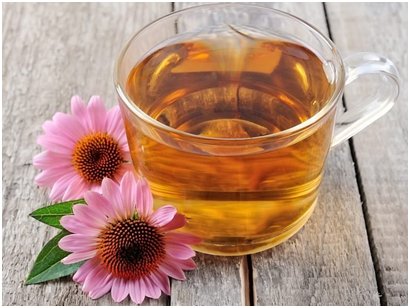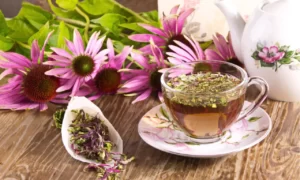Echinacea is a flowering plant that belongs to the daisy family. It is frequently used in cold treatment. Many people believe that taking echinacea supplements will help your body fight infections and illnesses like the common cold. Echinacea, also known as purple coneflower, has been used by Native Americans to treat a variety of ailments.

Echinacea tea is made from the Echinacea plant’s leaves, stems, and flowers. It is thought to boost the immune system and is commonly used to treat colds and the flu. Some people use it to treat allergies and other respiratory issues.
The use of Echinacea for the common cold is supported by some scientific evidence. According to one review of 14 studies, Echinacea may shorten the duration of the common cold by about one and a half days.
The quality of the studies included in this review, however, was mixed, and more research is needed to confirm Echinacea’s effectiveness for the common cold.
There is also some evidence that Echinacea may be beneficial for other conditions such as allergies, hay fever, and sinus infections. More research is needed, however, to confirm Echinacea’s effectiveness for these conditions.
Here are a few recipes that incorporate echinacea:
Echinacea tea: Steep dried echinacea leaves or flowers in hot water for 5 to 10 minutes to make echinacea tea. You can either sweeten the tea with honey or drink it plain.
Echinacea tincture: To make an echinacea tincture, combine equal parts echinacea and alcohol (such as vodka). Allow the mixture to steep for 4-6 weeks, occasionally shaking it. Using a cheesecloth, strain the mixture and store it in a dark glass bottle.
Echinacea salve: To make an echinacea salve, combine equal parts echinacea and a carrier oil (such as olive oil or coconut oil) and heat until the echinacea is completely infused into the oil. Allow the mixture to cool and solidify before transferring it to a jar.
Echinacea syrup: To make echinacea syrup, combine equal parts echinacea and sugar in a saucepan and heat until the sugar dissolves. Refrigerate the mixture after straining it.
How to make Echinacea tea?
We need the following recipes:
- Dried Echinacea leaves and flowers
- Water
- A tea infuser or a strainer
- Honey or sugar (optional)
Here’s how to prepare the tea:
- Bring water to a boil in a kettle or on the stove.
- In a cup or mug, place a tea infuser or strainer.
- To the infuser or strainer, add a spoonful of dried Echinacea leaves and flowers.
- Over the Echinacea, pour the hot water.
- Allow 5-10 minutes for the tea to steep.
- Remove the strainer or infuser and discard the Echinacea.
- Sweeten the tea with honey or sugar if desired.
The recommended daily dose of Echinacea tea is 2-3 cups. It is not recommended to exceed this amount because it may cause dizziness or nausea. People who have autoimmune diseases or allergies to plants in the daisy family should avoid using echinacea.
Health benefits of Echinacea
Echinacea is widely used to prevent infections, particularly colds and flu. Furthermore, it is used to treat upper respiratory tract diseases. This is due to the fact that it is a viable alternative to antibiotics. Echinacea aids in the prevention of oxidative damage and lowers the risk of chronic diseases.
Echinacea can be used to prevent a variety of diseases. It can, for example, aid in the treatment of colds and flu. Furthermore, its antiviral properties are incredible. This, however, is not the ultimate antiviral. As a result, before taking large amounts of echinacea, you should consult a doctor.
Echinacea contains numerous plant components that act as antioxidants. Flavonoids, cichoric acid, and rosmarinic acid are some of the antioxidants found in the echinacea plant. Fruit and flower extracts contain more antioxidants than leaves and roots.
Furthermore, echinacea plants contain alkamides, which may increase antioxidant activity even further. Alkamides may replenish depleted antioxidants and aid antioxidants in reaching oxidatively damaged molecules.
Many studies have shown that Echinacea herbal extracts improve the immune system. It boosts the number of white blood cells, which fight infection. Furthermore, numerous studies have shown that this herb can help your body fight infections and viruses, allowing you to recover from illness faster.
It should be noted that Echinacea is not a cure for the common cold or other conditions, and it should not be used in place of medical treatment. If you are thinking about using Echinacea for a specific health condition, you should always consult with a healthcare professional first.

Naorem Mohen is a natural farmer, full-time blogger, and entrepreneur dedicated to promoting Manipur’s black rice Chakhao, local beverages, and edible mushrooms.

